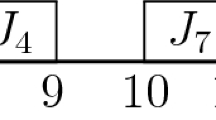Abstract
We study the problem of minimizing the number of late jobs on a single machine where job processing times are known precisely and due dates are uncertain. The uncertainty is captured through a set of scenarios. In this environment, an appropriate criterion to select a schedule is to find one with the best worst-case performance, which minimizes the maximum number of late jobs over all scenarios. For a variable number of scenarios and two distinct due dates over all scenarios, the problem is proved NP-hard in the strong sense and non-approximable in pseudo-polynomial time with approximation ratio less than 2. It is polynomially solvable if the number s of scenarios and the number v of distinct due dates over all scenarios are given constants. An O(nlog n) time s-approximation algorithm is suggested for the general case, where n is the number of jobs, and a polynomial 3-approximation algorithm is suggested for the case of unit-time jobs and a constant number of scenarios. Furthermore, an O(n s+v−2/(v−1)v−2) time dynamic programming algorithm is presented for the case of unit-time jobs. The problem with unit-time jobs and the number of late jobs not exceeding a given constant value is solvable in polynomial time by an enumeration algorithm. The obtained results are related to a min-max assignment problem, an exact assignment problem and a multi-agent scheduling problem.
Similar content being viewed by others
Explore related subjects
Discover the latest articles, news and stories from top researchers in related subjects.References
Agnetis, A., Mirchandani, P. B., Pacciarelli, D., & Pacifici, A. (2004). Scheduling problems with two competing agents. Operations Research, 52, 229–242.
Aissi, H., Bazgan, C., & Vanderpooten, D. (2005). Complexity of the min-max and min-max regret assignment problem. Operations Research Letters, 33, 634–640.
Aloulou, M. A., & Della-Croce, F. (2008). Complexity of one machine scheduling problems under scenario-based uncertainty. Operations Research Letters, 36, 338–342.
Cheng, T. C. E., Ng, C. T., & Yuan, J. J. (2006). Multi-agent scheduling on a single machine to minimize total weighted number of tardy jobs. Theoretical Computer Science, 362, 273–281.
Deineko, V., & Woeginger, G. J. (2006). On the robust assignment problem under a fixed number of cost scenarios. Operations Research Letters, 34, 175–179.
Garey, M. R., & Johnson, D. S. (1979). Computers and intractability: A guide to the theory of NP-completeness. New York: Freeman.
Karzanov, A. V. (1987). Maximum matching of given weight in complete and complete bipartite graphs. Cybernetics, 23, 8–13 Translation from Kibernetika, 1, 7–11 (1987) (in Russian).
Kouvelis, P., & Yu, G. (1997). Robust discrete optimization and its applications. Dordrecht: Kluwer Academic.
Moore, J. M. (1968). A n job, one machine scheduling algorithm for minimizing the number of late jobs. Management Science, 15, 102–109.
Mulmuley, K., Vazirani, U. V., & Vazirani, V. V. (1987). Matching is as easy as matrix inversion. Combinatorica, 7, 105–103.
Papadimitriou, C. H., & Yannakakis, M. (1982). The complexity of restricted spanning tree problems. Journal of the ACM, 29, 285–309.
Author information
Authors and Affiliations
Corresponding author
Rights and permissions
About this article
Cite this article
Aissi, H., Aloulou, M.A. & Kovalyov, M.Y. Minimizing the number of late jobs on a single machine under due date uncertainty. J Sched 14, 351–360 (2011). https://doi.org/10.1007/s10951-010-0183-z
Published:
Issue Date:
DOI: https://doi.org/10.1007/s10951-010-0183-z




